Thoughts on the Mac OS X Mountain Lion Developer Preview
by Andrew Cunningham & Anand Lal Shimpi on February 19, 2012 7:40 PM EST- Posted in
- Mountain Lion
- Mac
- macOS
General Impressions: The iPad-ification of the Mac
With Mountain Lion Apple officially drops the Mac prefix to the OS, it's now simply OS X 10.8. It's interesting (and perhaps deliberate?) that Apple keeps speaking of the updates in Lion/Mountain Lion as bringing iPad features to the Mac, not just iOS features. Perhaps that speaks to the nature of the convergence we'll see going forward.
There was a time in the microprocessor business where AMD and Intel felt that the ideal architecture for low power was mutually exclusive with the ideal architecture for high performance. Over time it became very evident that what makes you power efficient often gives you great performance as well. What we saw was a unification of mobile and desktop CPU architectures as a result. Although you could argue that the same sort of product bifurcation is happening now with the popularity of smartphone SoCs, I suspect we'll eventually see more convergence there in terms of features over time.
I do wonder whether we'll see a similar transformation in the OS space. Much of the discussion has been focused around bringing iOS user experience and features to OS X, however I'm more curious about whether we'll see a more fundamental merging of the two OSes over time. Today Apple has an i and an X line of operating systems, but what's to say that we won't see an eventual unification there. In many ways this would be a motivation for OS X on ARM, but it's a similar (and possibly a stronger) motivation for iOS on x86.
For this developer preview, the download and installation processes are identical to Lion - you still get the OS from the Mac App Store, it still creates a recovery partition for diagnostic and reinstallation purposes, and it still looks and acts mostly the same. If you made a USB or DVD installer for Lion from the App Store installer, that method continues to work here.
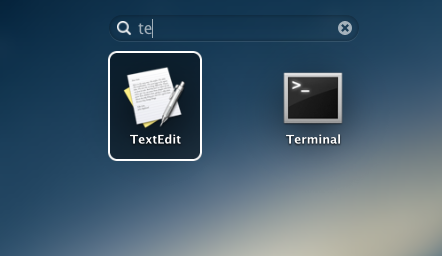
The Mountain Lion Finder, along with Lion additions like Launchpad and Mission Control, are at this point largely identical to their Lion counterparts. There are two obvious new features right now: first, Launchpad now includes a search box at the top of the window that lets you browse your installed apps. Compared to Spotlight, I find it to be of dubious usefulness, but I'm already on the record as finding the whole Launchpad concept to be of dubious usefulness - take my opinion as you will.
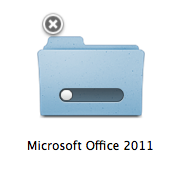
The other addition is also vaguely iOS-ish - you can cancel file copy operations in progress by clicking an X in the icon's upper left-hand corner (see above). Once a copy operation is complete, you delete the files by dragging them to the Trash just as before.
Safari 5.2
Safari 5.2, which is also currently available to developers as a beta for Lion, bumps the browser's WebKit version to 535.18.5, and brings with it some performance improvements and features. Features first: tabs now work as they do on the iPad, with each tab taking up an equal amount of space across the window - in Safari 5.1 and most other desktop browsers, new tabs are a fixed width (in both cases, the tabs begin to contract as you open more of them).
The address bar and search bar in the new Safari are also unified (as in Chrome and IE) - when you begin typing, the browser will search your default search engine, your bookmarks and history, and the content on the current page for matches. The Safari Reader button is now present to the right of the search/address bar at all times.
There's a new passwords manager in Safari that allows you to view and remove any stored user name/password combinations for websites you've visited. In the past this information was only accessible through the OS X Keychain but now it's available in both places.
Now, for performance - Safari 5.2 is measurably faster than Safari 5.1.3, and while it doesn't beat the latest stable versions of Firefox or Chrome in the tests below, the upgrade at least keeps Apple's default browser competitive. The problem is that this performance is a moving target - if Safari 5.2 doesn't launch before Mountain Lion's release this summer, both Mozilla and Google will have released several minor upgrades to their browsers that may help them pull even further ahead of Apple's latest. Interestingly enough the new Safari is actually faster than the latest stable build of Chrome in SunSpider but it loses everywhere else. Subjectively Safari feels fast but still not quite as fast as Chrome, although the two are much closer now.
These tests were run on a late 2010 MacBook Air, which runs a 1.6 GHz Core 2 Duo - please try to remember that before you laugh at any of these scores.
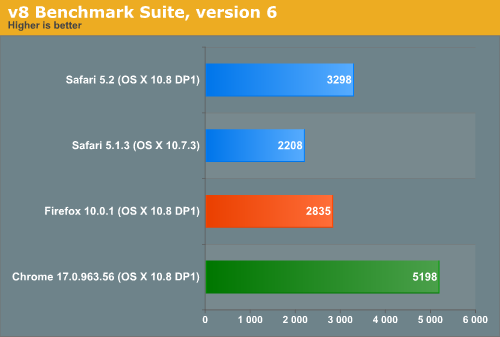
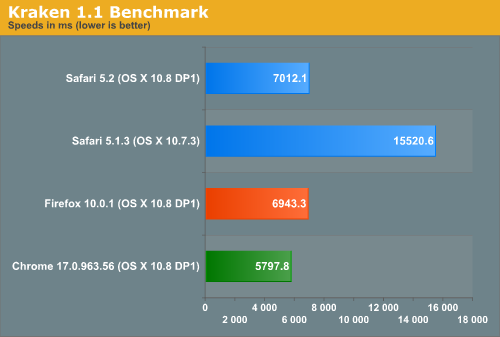
Apple Remote Desktop and Screen Sharing
The Apple Remote Desktop client in Mountain Lion has been updated to 3.6, which continues the years-long tradition of bumping the ARD version to support a new OS X release without adding enough fuctionality to justify a major version change. ARD gains IPv6 support and can now report information about batteries, trackpads, and Thunderbolt peripherals, but none of this fundamentally changes how the software works.
On a related note, Screen Sharing is made marginally more functional by the addition of controls at the top of the window - they don't really add anything that wasn't there, but they pull functionality that was previously hidden in menus and expose it to the user. Screen Sharing also supports drag-and-drop file sharing between connected computers, something previously limited to the full Apple Remote Desktop package.



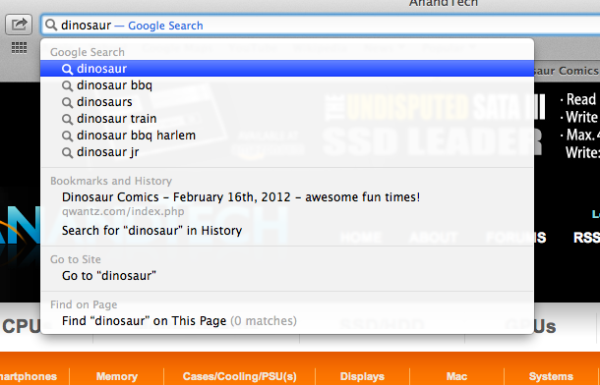
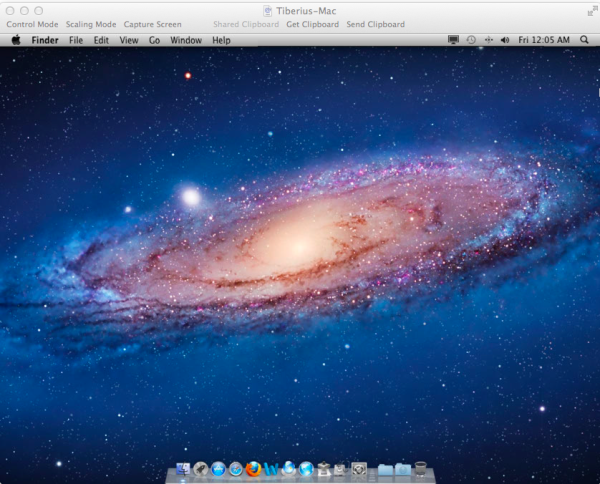








96 Comments
View All Comments
Death666Angel - Monday, February 20, 2012 - link
I am not an Apple buyer, so I don't use OS X. I've seen it on he MacBook and tried it for 5 minutes and couldn't get anything to work. ^^ I'm sure it works for a lot of people, though.What I found a bit odd in your conclusion was that there is competition in the OS space. I really don't see that. As long as Apple doesn't open OS X up to non-Apple PCs, OS X is not a competition to Windows. The Mac sales in the US may look quite good, but world wide, OS X doesn't really play a role, as far as I know. I'd like to try OS X again, but I'm not going to cough up the money for an Apple PC to do it. :-)
colonelclaw - Monday, February 20, 2012 - link
I take care of a lot of Macs for friends and family. As an unscientific observation, those who have older hardware (some up to 10 years old, but mostly 4+ years old) don't care about not having the latest OS. Those on the newer hardware are always bugging me to 'upgrade' their systems (i.e put on Lion and everything Adobe makes for free).Consequently I would say not supporting older hardware is not a big deal. There seem to be 2 types of computer user in this world, those who want the latest and greatest of everything, and those who just don't care as long as it works.
Death666Angel - Monday, February 20, 2012 - link
Since you take care of those, you should make sure that everyone is running the latest software, if only to ensure that everyone is as secure as they can be. Newer OS isn't just for added features, it is also to close bugs, exploits etc. People not wanting newer software because their current one runs good enough are the same people who will get their credit card maxed by thieves.nortexoid - Monday, February 20, 2012 - link
Quibble: there's a section titled "Unsupported Macs" and then a list of Macs just below that. If one doesn't read the paragraph above (and there's no reason to think they *ought* to), one will be confused by the list.Andrew.a.cunningham - Monday, February 20, 2012 - link
Then it's a good thing you read the paragraph above, right? I mean, what are we all here for, if not to exchange information using words?Andrew.a.cunningham - Monday, February 20, 2012 - link
Sarcasm aside, though, your point is well-taken, and I tweaked the subhead. :-)repoman27 - Monday, February 20, 2012 - link
Neither the original article nor any of the user comments I read pointed out an obvious benefit of shifting the distribution of widely adopted apps to "App Store" models—namely a more unified software update interface. I fired up a client's MacBook the other day just to change a few system settings and configure her email client with a new account. Because she had only lightly used the machine in the past few weeks, I was confronted with 5 different auto-update dialogs in the space of 20 minutes. Most Windows machines I see have about a dozen startup processes or services designed to check for software updates automatically on top of Microsoft Update. For many small businesses that don't maintain dedicated update servers, have legacy equipment or less than stellar internet connections, the only option is to disable automatic update checking for virtually everything and then periodically perform manual updates of all the software on each machine.I kinda like the iOS way, where every now and then when I'm at home and on WiFi, I glance at my home screen, and I can see a little red badge on the App Store icon with a number telling me how many apps have available updates. I can peruse them first, then tap "Update All" and be done with it. It really should be this easy on PC's as well (and even better if you could just as easily roll back an app to a prior installed version if the update breaks something.) Apple providing a very low overhead push notification server that any developer can use to notify their users of updates, and a centralized way of downloading and installing those updates is one step closer to things just working the way they should.
In a previous comment, someone made the analogy to the changes the automotive industry has undergone in the past 30-40 years. I use this analogy all the time. For a while people lamented the perceived loss of ability to maintain their own cars, but the tradeoff is that most people drive vastly more reliable vehicles than they did a few decades ago and don't miss changing a water pump themselves one bit. I for one really hope that personal computers get to the point where they "just work" the way cars do these days. And despite the more proprietary nature of cars nowadays, the tinkerers and those that perform their own repairs are certainly far from extinct—they just had to acquire different tools and skill sets.
As for software developers not wanting to give Apple 30% of the retail take, unless they primarily sell directly and can scale well with demand, they often sacrifice more than that to whatever distribution channels they do use. In most instances (i.e. for the most popular apps), those not buying volume licenses (which aren't yet available for non-Apple apps in the Mac App Store anyway) tend to buy from a discount retailer. Between the discounted price and the fact that the retailer is taking a cut, we can deduce that the publisher has probably wholesaled the license at 70% or less of full retail.
Death666Angel - Monday, February 20, 2012 - link
Considering the kind of information my internet-machine has on me versus my car, I don't really see how they stack up. I don't want Apple or Microsoft or Google turning their OS into another Facebook.repoman27 - Monday, February 20, 2012 - link
Many cars already have embedded GPS and mobile communication hardware, microphones and cameras and other sensors. Some new models are touting built in Wi-Fi. Once you start browsing pron from you car, there really won't be much difference.And I don't really see how app stores could turn an OS into Facebook. Apple, Microsoft and Google all provide browsers, Microsoft and Google have search engines, and Apple has iTunes. I'm not sure what they'll learn about you from an OS level app store that they don't already know.
Death666Angel - Tuesday, February 21, 2012 - link
So, you store passwords, private information, handle money transactions through your car? If you don't see how a machine to enter the internet and community with the world is different from a vehicle, you clearly are not living on my plane of existence.As for the Facebook, you were saying that we should just let the companies run these black boxes and not worry about it. But I see that this would give these companies a chance to gather ever more information from us. Your argument that they already have stuff to gather such information isn't anything contrary to my stance.